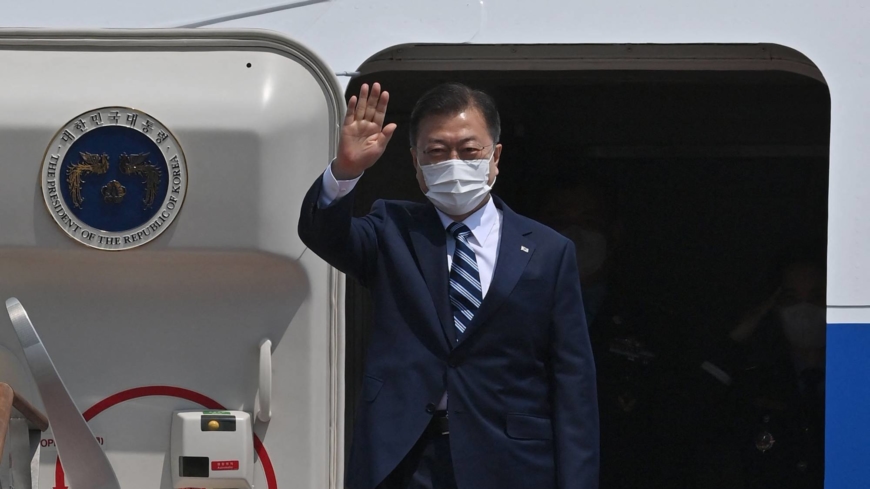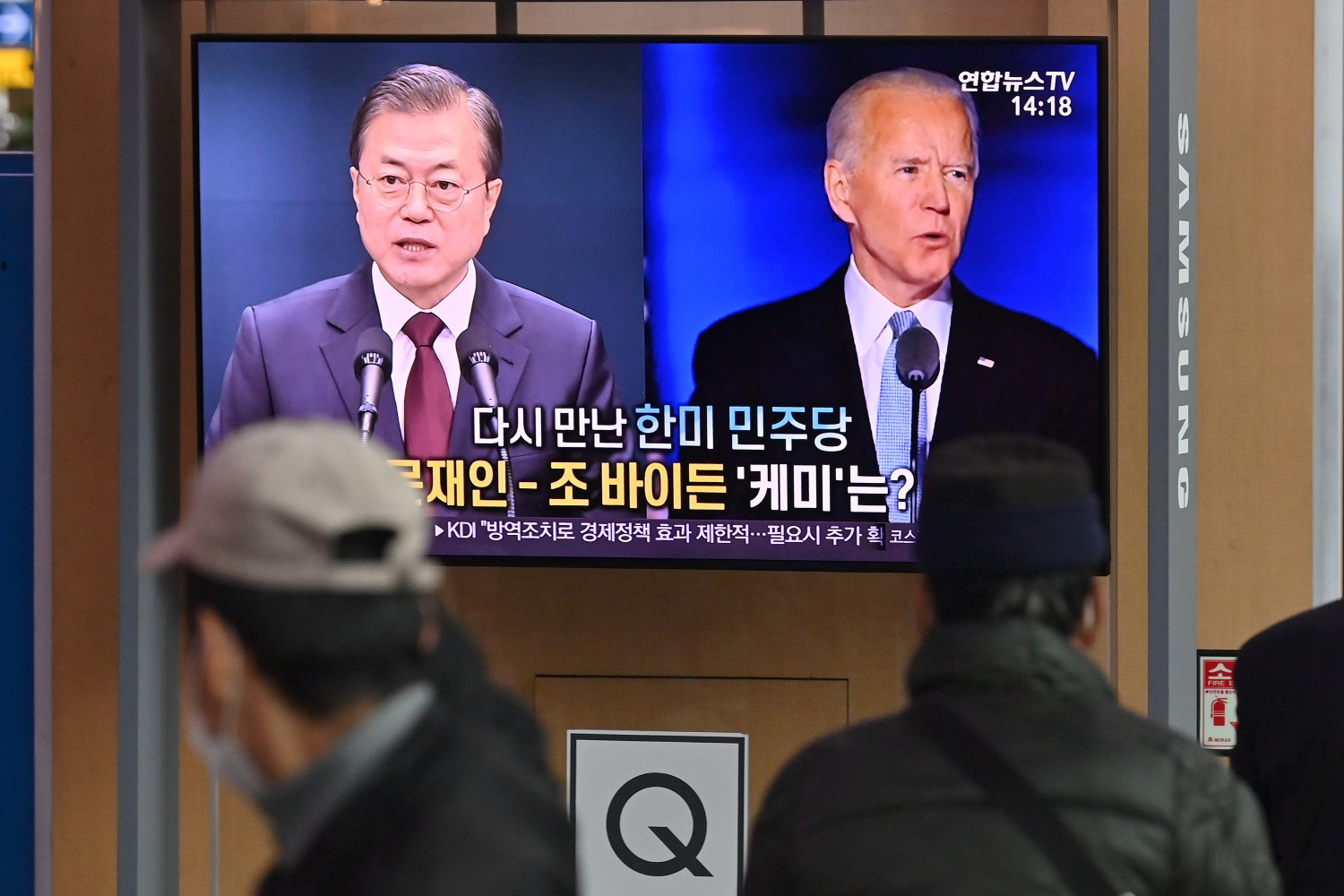
President Moon Jae-in of the Republic of Korea (ROK) waves from the steps of his plane as he leaves for the U.S. at Seoul Air Base in Seongnam, south of Seoul, May 19, 2021. /AFP
President Moon Jae-in of the Republic of Korea (ROK) waves from the steps of his plane as he leaves for the U.S. at Seoul Air Base in Seongnam, south of Seoul, May 19, 2021. /AFP
Editor's note: Tom Fowdy is a British political and international relations analyst and a graduate of Durham and Oxford universities. He writes on topics pertaining to China, the DPRK, Britain and the U.S. The article reflects the author's opinions and not necessarily the views of CGTN.
On May 21, President Moon Jae-in of the Republic of Korea (ROK) met with U.S. President Joe Biden in Washington, reaffirming the U.S.-ROK relationship and alliance with a focus on Pyongyang. The two parties agreed to advance "complete denuclearization of the Korean Peninsula and their intent to address the Democratic People's Republic of Korea's (DPRK's) nuclear and ballistic missile programs."
They vowed to take a "calibrated and practical approach that is open to and will explore diplomacy with the DPRK to make tangible progress" - something which the previous administration failed to achieve despite warm summits between Donald Trump and Kim Jong Un.
The primary failure of America's lack of headway on the DPRK issue is the insistence upon zero-sum, unilateral denuclearization as an immediate and rigid outcome upfront in exchange for any potential concessions on sanctions, a position which Pyongyang has long found unacceptable in relation to its own security interests.
While the DPRK is not unwilling to improve its relationship with the United States, their nuclear program is seen as tantamount to national survival and is the only leverage they have in negotiations, and are prepared to suffer costs to sustain it, making them unsusceptible to extreme pressure. Trump's uncompromising insistence on complete denuclearization soured the Hanoi Summit between the two leaders in early 2019 and no progress has been made since.
America accordingly has also blocked the advancement of peace and any denuclearization steps by refusing to allow the ROK to engage in inter-Korean peace initiatives and projects despite having been specified in the Panmunjom Declaration of April 2018 to do so. This has tied Seoul's hands, made them a passenger in the international process and provoked anger from Pyongyang, whom subsequently destroyed the inter-Korean liaison office in 2020 as a sign of disapproval.
The Moon presidency has long envisioned to re-establish the Kaesong Industrial Complex, reignite inter-Korean tourism projects once the pandemic is over and likewise other economic activities, aiming to use integration as a trust and peace building initiative.
In this case, the obvious way forwards for the DPRK nuclear issue is not simply rhetoric but pragmatic induced compromise which aims to achieve tangible results without imposing strategically unacceptable, zero-sum demands on Pyongyang. The original Trump-era deal which was undermined by former national security advisor John Bolton concerned closing the Yongbyon nuclear facility in exchange for offering sanctions relief continues to be a good template for a starting point.

A television news program reporting on the U.S. presidential election shows images of then-U.S. President-elect Joe Biden and ROK President Moon Jae-in at a railway station in Seoul, November 9, 2020. /Reuters
A television news program reporting on the U.S. presidential election shows images of then-U.S. President-elect Joe Biden and ROK President Moon Jae-in at a railway station in Seoul, November 9, 2020. /Reuters
Washington should look to broker a deal which caps the DPRK's nuclear development at its current capacity and walks back on room for expansion. This however, is a bar which is moving quickly. Kim Jong Un has otherwise sent diplomatic signals indicating the country will continue to advance its capabilities and weapons, and may likewise engage in tests or provocations if it becomes dissatisfied with the U.S. position.
Likewise, peace and stability on the Korean peninsula is also likely to be disrupted if the United States continues to push in the attempt to force the ROK into an anti-China alliance. The Joint Statement produced by the two leaders in Washington did not directly call out Beijing in contrast to the one produced with Japan earlier. However, one can note that Biden sought to fudge in a number of anti-China issues towards Seoul pushing them to mention the South China Sea, the Taiwan Straits and a "free and open-Indo-Pacific."
The agenda is obvious, major foreign policy commentators and think tanks within the U.S. are all pushing for the ROK to "take a side." However, the China-ROK strategic partnership remains important for safeguarding peace, security and coordination on the DPRK issue, as well as a robust economic relationship.
For the United States to attempt to lockstep Seoul into the anti-China "Quad" grouping would pose tremendous risks. The Korean peninsula cannot and should not return to a Cold War era alignment whereby Seoul and Washington square off against Pyongyang and Beijing, a situation which would undermine the respective interests of both China and the ROK.
Next year, Beijing and Seoul will celebrate 30 years of relations, a partnership which broken down old Cold War rivalries and promoted common peace and prosperity. It is important subsequently that China and the ROK move to reset relations, move past old disputes and focus on promoting their own bilateral trade relationship.
Ultimately, the DPRK issue must be handled with an open, pragmatic and multilateral approach which places dialogue at its core avoids rendering the situation as a zero-sum game, be it in respect to Pyongyang or for that matter Beijing. All countries must work together in the common goal of ensuring peace, stability and mutual respect. The DPRK has genuine concerns about its own sovereignty, and the longstanding attitude of attempting to force or strangle them into submission has not yielded results. It's time for a new approach, a fairer approach.
(If you want to contribute and have specific expertise, please contact us at opinions@cgtn.com.)

